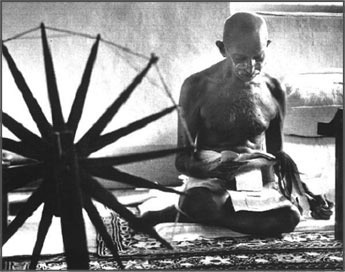The failure of Non-Cooperation movement had deeply pained Gandhiji . He thought India was Few Critics had emerged who started saying that nothing could be achieved through Non-violence and were creating an upsurge for arms movement like Subhas Chandra Bose.
Thus Gandhi was very keen to show to the world and his fellow Indians the power of Non-violence. Thus he started Salt Satyagraha, also known as Dandi March. According to laws impesed by Britishers ‘Salt” as a commodity was made monopoly and no Indian was permitted to make the salt or sell it.
On 1st March he took vow to break this law, as salt is a household essential commodity and as he believed it was not moral to have such laws on household commodity. On the same day he wrote a letter to the then Viceroy of India, Lord Irwin (later Lord Halifax). He said “on the eleventh day of this month I shall proceed with such co-workers of the Ashram as I can take, to disregard the provisions of the salt laws….”. He has also requested Lord Irwin to find a way out or else warned him of the consequences.
On August 22, 1906, the ordinance was published in the Transvaal Government Gazatte Extra ordinary. According to which every Indian entitle to reside in Transvaal- must register his/her name with Registrar of Asiatics and carry that certificate of registration. About the legislation he had said – “I have never known legislation of this nature being directed against free men in any part of world”. Here he launched a ‘Satyagraha’ movement and passed it as fourth resolution of congress. Indians decided not to submit to ordinance and face any penalties attaching to non-submission. Eventually he along with other leasers were arrested, put to jail. Finally General Smuts called him for talk and a settlement was reached.
For this settlement, the unhappy Indian fellow Mr. Alam, decided to kill Gandhi and attacked him. Consequently he did not die, and Alam guilty and pardoned him. This was on instance of Mahatma being truly Mahatma.
But the Government did not do as was promised by General Smuts and now more severe laws were enacted and also making the Indian Marriage illegal. This pained to Gandhi and he call for resumption of Satyagraha.
Now, each one became a Satyagraha and led their support for this mass movement.
The movement caught up the fire and everyone started supporting it and understanding it. Gandhi called the movement as – “we decided to offer stubborn Satyagraha irrespective of the number of fighters”. Every women also joined hands with Gandhi. Gokhale came to South-Africa, tried to resolve the matter and consolidate Gandhi and Government.
Finally General Smuts appointed commission and commission recommended acceptance of the demands of the Indian Community and all those devil acts were taken back, It was a major Trumph of Gandhi, his followers, his principle, his principle, his philosophy and his belief. It was victory of Satyagraha, and now Gandhi was not just a barrister but a leader of a successful campaign.
South Africa taught Gandhi the power of Non-violence, truth, and tolerance. For that he had been completely transformed from a barrister to a Satyagraha and a true Mahatma. So, when he returned India, he brought hope of similar freedom and success in India.
Thus we can truly say that in 1893, a barrister, left for South-Africa from India and in January 1915 a Mahatma, a true leader, an apostle of Non-violence and Truth returned India.
Sunday, September 30, 2007
Salt Satyagraha – an extraordinary example of Non-violent direct action.
Posted by
Adi
at
1:40 AM
![]()
Subscribe to:
Post Comments (Atom)








No comments:
Post a Comment